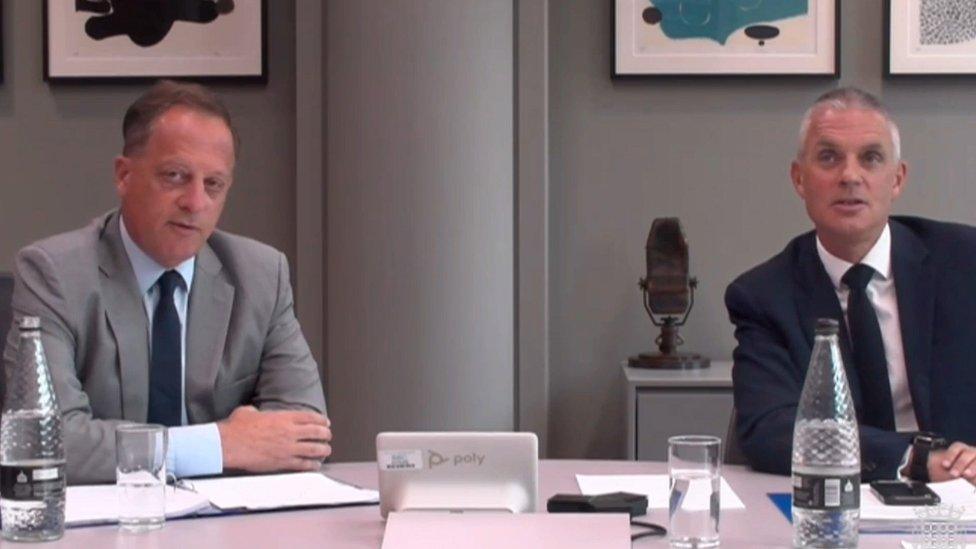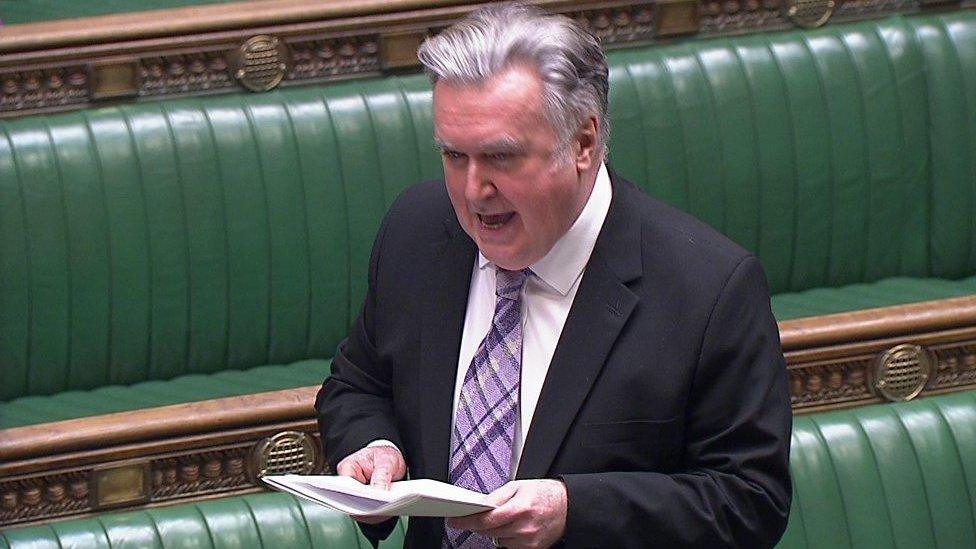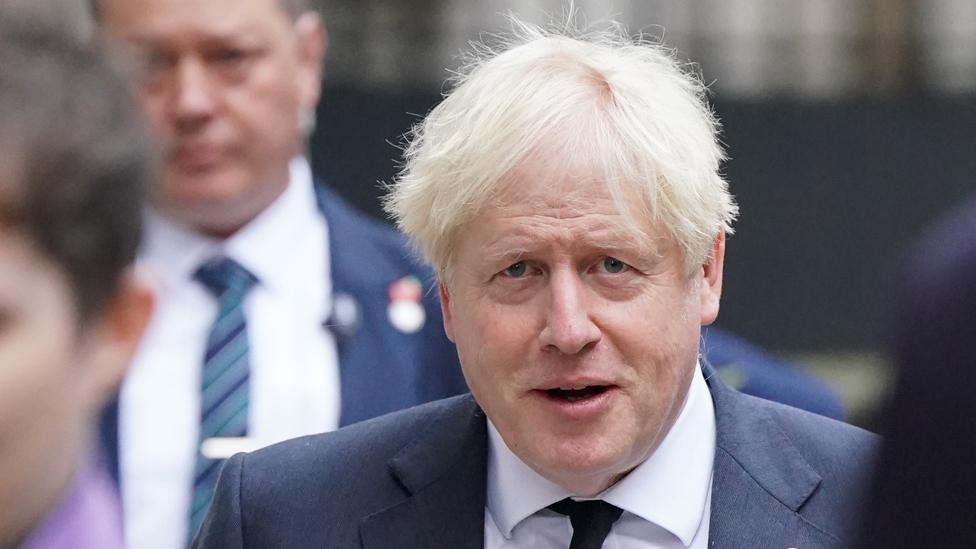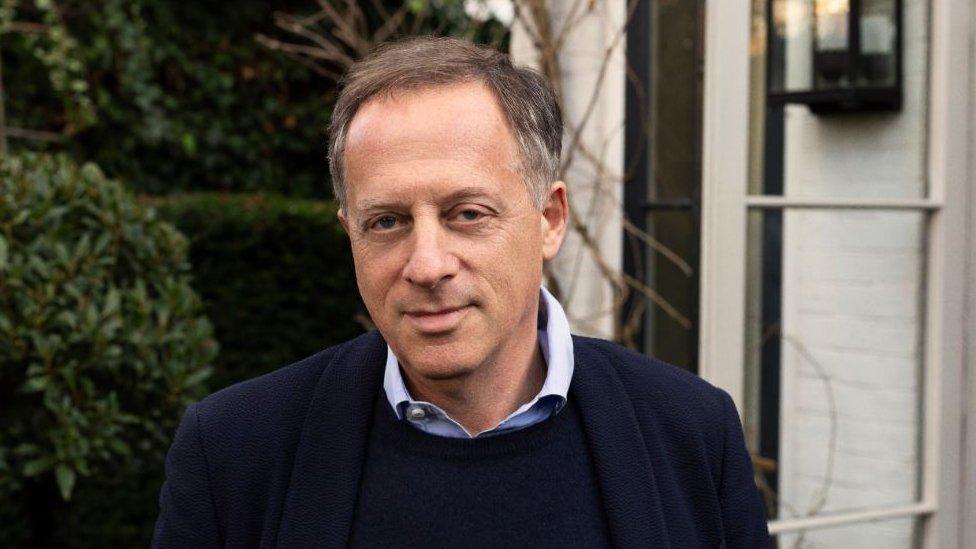Richard Sharp: Watchdog review begins into BBC chairman's hiring
- Published

Richard Sharp and Tim Davie, the BBC director general
The process of hiring BBC chairman Richard Sharp is to be reviewed by the watchdog that oversees how public appointments are made.
It follows claims that shortly before being given the job, Mr Sharp helped the then-prime minister, Boris Johnson, secure a loan guarantee agreement.
William Shawcross, the Commissioner for Public Appointments, said the review would ensure the hiring followed rules.
Mr Sharp said he "simply connected" people and did not arrange financing.
According to The Sunday Times,, external Mr Sharp was involved in discussions about a loan worth up to £800,000 for Mr Johnson in December 2020.
The paper reports that multimillionaire Canadian businessman Sam Blyth - a distant cousin of Mr Johnson - raised with Mr Sharp the idea of acting as Mr Johnson's guarantor for a loan. Mr Sharp then introduced Mr Blyth to Simon Case, the then-cabinet secretary and head of the civil service, the Times says.
Mr Johnson, Mr Sharp and Mr Blyth later had dinner together, the Times reports.
A few weeks later, in January 2021, Mr Sharp - a former Goldman Sachs banker - was announced as the government's choice for the new BBC chairman. His role entails upholding and protecting the BBC's independence and ensuring it fulfils its mission.
The timing of these reported events has led to questions about how Downing Street decided he should have the job and whether the process was fair.
The government's choice for the BBC chairman job is ultimately decided by the prime minister, on the advice of the culture secretary, who is in turn advised by a panel.
Mr Sharp, Mr Johnson and the government all deny there was a conflict of interest. On Monday, Cabinet Office minister Jeremy Quin described the appointment as an "incredibly robust process".
Mr Shawcross - who is in charge of regulating how people are hired to public roles, such as the Bank of England governor or BBC chairman - announced his review on Monday, after Labour had written to him over the weekend calling for him to do so.
He said his job was to "ensure appointments are made fairly, openly and on merit".
Mr Sharp said he welcomed the commissioner's review. The top civil servant at the Department for Digital, Culture, Media and Sport, Sarah Healey, has already said she has been asked to submit documents about the hiring to Mr Shawcross in the next 10 days.
Earlier, Mr Sharp announced that the BBC Board - which he chairs - would hold a review into any potential conflicts of interest when it next meets, without giving a timeline.
This BBC review is not an investigation into what led to his appointment - but will look at whether any declarations of personal of interests are accurate, up to date and whether they affect his role.
The body that will look at this is the BBC Nominations Committee, which is headed by Mr Sharp as chairman. However, the BBC understands he would recuse himself from this exercise in due diligence.
In an email to BBC staff on Monday, Mr Sharp said: "I believe firmly that I was appointed on merit, which the Cabinet Office have also confirmed."
Giving his account of events, Mr Sharp said his "old friend" Mr Blyth became "aware of the financial pressures on the then prime minister, and being a successful entrepreneur, he told me he wanted to explore whether he could assist".
"He spoke to me because he trusts me and wanted to check with me what the right way to go about this could be. I told him that this was a sensitive area in any event, particularly so as Sam [Blyth] is a Canadian, and that he should seek to have the Cabinet Office involved and have the cabinet secretary advise on appropriateness and indeed whether any financial support Sam might wish to provide was possible.
"Accordingly Sam asked me whether I would connect him with the cabinet secretary."
Mr Sharp added: "I went to see the cabinet secretary and explained who Sam was, and that as a cousin of the then prime minister he wanted to help him if possible. I also reminded the cabinet secretary that I had submitted my application for the position of BBC chairman.
"We both agreed that to avoid any conflict that I should have nothing further to do with the matter. At that point there was no detail on the proposed arrangements and I had no knowledge of whether any assistance was possible, or could be agreed."
"Since that meeting I have had no involvement whatsoever with any process," he added.
Watch: MPs question appointment of BBC chairman. 'It's all a bit banana republic, is it not?'
In the Commons on Monday, SNP MP John Nicolson brought up the issue in an urgent question, saying: "Mr Sharp appeared before the Culture Select Committee on which I sit.
"We grilled him about his £400,000 gift to the Conservative Party. However he did not disclose his role in getting the man appointing him a huge loan….
"Even by the grubby standards of this government, it's all a bit banana republic is it not?"
In response, Cabinet Office minister Jeremy Quin described the appointment as an "incredibly robust process".
He told MPs: "There was a very robust process in place for the appointment of the chairman at the BBC, including a pre-appointment hearing."
Former BBC broadcaster Jonathan Dimbleby said: "I have no reason at all to doubt Richard Sharp's integrity. The problem is the manner of the appointment. In times when the public is alarmingly lacking in trust of our public institutions, everything has to be crystal clear and transparent.
"It does not mean, of course, there was a conflict of interest, but the appearance of a conflict of interest is what is important."
Mr Johnson described any claims of improper behaviour as "a load of complete nonsense".
He told Sky News on Monday: "Let me just tell you, Richard Sharp is a good and wise man but he knows absolutely nothing about my personal finances - I can tell you that for 100% ding dang sure."
Downing Street has rejected allegations of "cronyism" and Prime Minister Rishi Sunak also defended the BBC appointment process as "rigorous" and "transparent".
Mr Sharp was an unpaid adviser on the government's business loan scheme during the pandemic, and was an economic adviser to Mr Johnson during his time as London mayor. Mr Sharp and Mr Sunak also worked together at Goldman Sachs investment bank.
It is not the first time there have been questions about a BBC chairman's links with the government. Many former politicians or people with close political ties have been appointed over the years.
But also there have been times where a an BBC chairman has clashed with government, like Labour appointment Gavyn Davies who resigned over a clash with Tony Blair's government.
Labour leader Sir Keir Starmer said there were "clearly serious questions to answer" on the loan row and said "we need to get to the bottom of this as quickly as possible".
The job of BBC chairman is different to that of BBC director general Tim Davie, who is the BBC's editor-in-chief, as well as creative and operational leader responsible for its global workforce.

PACE SETTER: The best dance music for your morning run
RESTLESS NIGHT?: Joe Wicks and Dr Matthew Walker discuss the importance of sleep

Related topics
- Published23 January 2023

- Published23 January 2023

- Published22 January 2023

- Published14 January 2021
